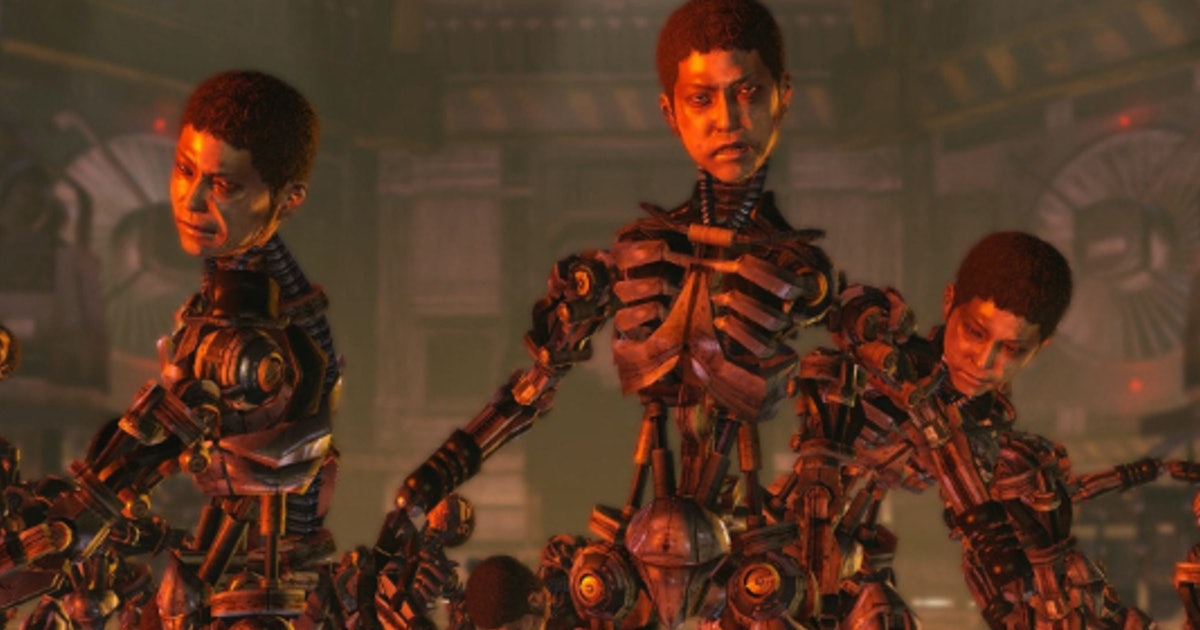
11 Years Ago, the Yakuza Team Made a Wildly Underrated Sci-Fi Shooter
Ryu Ga Gotoku Studio is utterly synonymous with the Yakuza series, especially seeing as the studio itself is named after the franchise. Despite that laser focus, however, the developer has a vibrant history of varied games, and ironically the first game released under the “RGG Studio” moniker in 2012 wasn’t even a Yakuza game. Instead, it was a wildly absurd sci-fi shooter called Binary Domain, which to this day remains the studio’s most criminally overlooked title.
While Binary Domain’s box art and initial marketing might have painted it as a bog standard sci-fi shooter, that’s actually incredibly far from the truth. It has its own flaws, but the further you dig the more you find a shooter with some fascinatingly experimental mechanics and a story that really goes to some thematically interesting places.
Binary Domain was directed by Toshihiro Nagoshi, best known as the creator of the Yakuza franchise, and it’s a surprisingly prescient sci-fi tale. Taking place in the near future, Binary Domain’s version of Earth has been ravaged by the effects of global warming, causing large swathes of land to flood. Much of humanity has drowned as a result, which has caused tech and robotics companies to flourish, replacing large portions of the workforce with advanced robots.
Binary Domain brilliantly uses the same “campy” tone the Yakuza games execute so well.
Sega
All of this eventually led to the passing of a “New Geneva Convention” that banned robots that could pass for humans. The events of Binary Domain start after an android attacks the headquarters of a robotics company named Bergen in Detroit, Michigan, with the big catch being that the android thought it was human the whole time.
Binary Domain obviously has some lofty narrative ambitions, and this setup leads to you taking control of Dan Marshall, a Nebraska-born special agent that serves as part of a “Rust Crew” for United Nations Security and is sent to infiltrate the Amada corporation in Japan, which breached the New Geneva Convention with its android attack in Detroit.
Dan is joined by specialists from around the world, all of whom are predictably stereotypical as you might expect from RGG Studio’s comedic style. You have squad members like a posh French robot named Cain, the gung-ho American special forces member nicknamed “Big Bo,” and a snooty British agent named Charles.
Despite not really being a horror game, Binary Domain does a good job of using “horrific” imagery.
Sega
Binary Domain lets you interact with these squad members in some interesting ways, giving you the ability to instantly issue commands during battle. The game even allows the use of voice commands for this system, if you’re so inclined. The ability to interact with your squad also ties into the story, however, with a consequences system that runs throughout the experience. The dialogue options you pick and actions you take can affect each squad member’s opinion of Dan, and both their effectiveness in battle and the actual storyline can change depending on the trust the squad has.
This puts an interesting layer of immersive storytelling as you make your way through the mostly linear experience. In terms of the actual shooting, Binary Domain falls right into the camp of all those third-person shooters of the Xbox 360/PS3 era. The game puts a massive emphasis on its cover system and working tactically with your squad to take down hordes of robotic enemies, which is where Binary Domain really gets interesting on the gameplay front.
Even Binary Domain’s most basic robotic enemies can be utterly terrifying, as they relentlessly try to eliminate you. Oftentimes when shooting one of the robotic enemies you’ll blow off an arm or a leg, which terrifyingly doesn’t stop them at all. Robots with legs blown off will get a burst of speed and relentlessly crawl toward you and try to claw you to bits.
The squad mechanics of Binary Domain can feel a bit finicky at times, but the way they tie into both gameplay and story is truly unique.
Sega
Despite not being a horror game, Binary Domain has some of the most horrific minute-to-minute gameplay moments I’ve ever seen in a shooter, and to this day I can remember the panic as I’m battling a horde of robots and an enemy I thought was downed suddenly comes rushing at me. Binary Domain’s actual shooting mechanics may feel just standard, but its brilliant enemy designs and squad mechanics are what really elevate it to something unique.
It’s hard to put into words, but Binary Domain simply has that special “something” that Ryu Ga Gotoku does so well. Just like with Yakuza, there’s an inherent charm and campiness to everything, even while the narrative explores hefty themes like what it means to live, the danger of technology, and human’s effect on the planet.
If Binary Domain came out today Ryu Ga Gotoku Studio’s current pedigree would almost guarantee it’s a hit, but back in 2012, with the studio mostly unknown in the West, it sadly got lumped into the generic sci-fi shooter category. It’s absolutely worth going back to today, however, as it not only holds up but is a fascinating look at a tried-and-true studio trying something wildly different and ambitious.
Ryu Ga Gotoku Studio is utterly synonymous with the Yakuza series, especially seeing as the studio itself is named after the franchise. Despite that laser focus, however, the developer has a vibrant history of varied games, and ironically the first game released under the “RGG Studio” moniker in 2012 wasn’t even a Yakuza game. Instead,…
Ryu Ga Gotoku Studio is utterly synonymous with the Yakuza series, especially seeing as the studio itself is named after the franchise. Despite that laser focus, however, the developer has a vibrant history of varied games, and ironically the first game released under the “RGG Studio” moniker in 2012 wasn’t even a Yakuza game. Instead,…